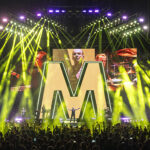
The Continuing Smartphone Issue at Concerts
They say never meet your rock idols. Because if you do, you might be disappointed. In these situations, your expectations are not met. A chance encounter with a musician you love could turn into a major letdown. While at a performance of the American progressive metal band Tool at SNHU Arena in Manchester, NH, in mid-November, I was reminded of an awkward and prophetic exchange I had with lead singer Maynard James Keenan decades prior.
As I stood and watched their incredible array of mesmerizing psychedelic sights and listened to the well-crafted, precise, and arpeggiated rhythms of their music, I could not help but notice the attentiveness of the audience forced by the band’s “no device policy.” It had been a long time since I witnessed a concert where someone was not glaring into a glowing blue screen. And boy… I forgot how much I missed that. Throughout the night, MJK’s disdain for cameras was evident, and I was able to make these connections from our brief and impactful encounter years ago.
Since then, Tool’s 30-year reign as one of the most revered and devoted rock bands was proven once again on this cold November night. I have always been a steadfast Tool fan, from their earliest EP Opiate (1992) and full-length inaugural effort Undertow (1993) until their latest and long-awaited Fear Inoculum (2019). In my view, this elusive and masterful band has very rarely failed, either in the studio or onstage.
In 2000, at A Perfect Circle’s sold-out performance at Boston’s now-defunct Avalon concert hall, I learned that frontman Maynard James Keenan (Tool, Pucifer, A Perfect Circle) and I shared mutual acquaintances. I was in my 20s then, naïve and eager to meet one of my favorite rock stars. I reached out to my friend, and the following year when MJK was in the area supporting Tool’s Lateralus at Great Woods in Mansfield, MA, she made the introduction.
When Maynard and I met (in true fan-boy fashion) I eagerly pulled out my Kodak Instamatic and asked for a picture. His spurning response to my request was “I only take photos with family.” Up until this point I had never had a rock star act so ungraciously, aside from David Crosby who told me to “f*ck off” while seeking an autograph. With my head hung low, I gave MJK his space and walked away. Even so, the Tool show was spectacular. I quickly got over it. It seems that MJK’s disdain for photos goes way back, and Tool has always been known for avoiding the limelight.
By the mid-2000s, the days of Bic lighter ballads were in the rearview. Collective use of phone devices at concerts was now being explored by a new generation of fans who raised the glowing lids of their Nokia flip phones in adoration. Many claim that this technological evolution has sparked a continuum of deteriorating social behavior, thus transforming live event space. Since the first iPhone was launched in 2007 (and every upgrade thereafter), the concertgoing experience has suffered greatly — and it’s evident. Now reaching a threshold, the recent excessive use of devices at concerts has been a bone of contention for almost every major touring band who are pining for the attention of their audiences. In my article Have Mobile Devices Killed the Live Music Experience? (FRONT of HOUSE, Feb. 2020) I elaborated on the consequences of such behaviors. Now, the question is, has the battle between live performances and phone-wielding concertgoers changed post-pandemic?
For Tool, it has drastically.
Throughout the 12,000-seat SNHU Arena (Manchester, NH), hundreds of signs were taped to the walls of doorways, and entrances surrounding the performance area. It was clear that there would be no tolerance for such behavior. I suppose most fans who are used to checking a quick text, or even capturing a short video could never expect how aggressive this policy might be. And if you dare to hold up your device at one of Tool’s shows, be prepared to be quickly escorted out of the building. For example, in October of 2023 at Blue Arena in Loveland, CO, some two-dozen people were escorted from their seats and quietly swept away by security for holding up their devices. According to a shunned fan in Elmont, NY (2022), “Last night I was at the concert at UBS Arena having a great time with some friends and minding my own business when without warning I was grabbed by security and thrown out of the venue. The only time I had my phone out at all was to answer a quick text from a friend who was at concessions asking if I wanted a beer, and I held it at waist level, so it was clear I wasn’t taking photos.” (Source: Reddit).
Whether you like it or not, in an age of behavioral device addiction, a Tool show might be your only vacation from your screen. And at most performances on this tour, MJK’s meager interactions with the crowd were only to remind you of their strict stipulations. Naturally, the policy has been met with intense criticism, claiming it’s overbearing and parental. In recent interviews, guitarist Adam Jones suggests (and defends) that not having a phone present keeps people connected with the Tool concert-going experience. It is not only respectful for the people sitting behind you but also for the band, who often tolerate intermittent flashing from misused devices. According to the aforementioned disgruntled Tool fan, “While I remain a fan of their music, I don’t think I’ll ever attend another concert of theirs again. How can I possibly enjoy myself at one when I’ll spend the whole show stressed out that security might drag me out again.”
As I looked on, the loyal NH Tool Army cheered ferociously in response to the band’s acute musicianship in a very authentic way… as they should. However, an awkward tension was also felt throughout the venue as the digital trigger-happy crowd was controlled by the fear of being removed if they pulled out their phones. And at nearly $300 a ticket, it wasn’t worth the chance. My friend who was checking his email was quickly asked to put his device away. These policies should not come as a surprise, however, as ticket holders are reminded on both the physical and eTicket.
Fans are also emailed by Tool Management, “We respectfully request that you please watch and listen to the show, not your phone. You will be ejected from the show without the opportunity to return and without a refund if you violate this simple request and elect to take photos during the performance. In the event of a personal emergency, phone use may occur on the concourse away from the performance area.”
Sadly, our phones have become like another appendage. And now we are faced with these newly innate social behaviors which seem to be fueled by the fear of missing out on something in the digital space. These “behaviors” are especially true in the concert setting, where so many people are conditioned to report back to their social platforms, only to “check-in” that they are present and having a great time. In the end, however, we are merely capturing the same images, only to be uploaded to the same platforms, all at the same time. And in this way, it all becomes so redundant and meaningless. In 2019, when MJK was asked about the group’s aggressive policy he snidely replied, “No. Recording. Of. Any. Kind. Unplug and enjoy the ride.” On this and previous tours, the evasive singer has sarcastically toyed with audiences, permitting video for the very last song. On one night he even directed security to hold back, so fans could check their email.
Let us not forget that for centuries, native cultures have considered photography disrespectful to the spiritual world. That it would steal a person’s soul. And for MJK, he too considers it to be a “demystifying” act, which is what I suppose he was getting at when he refused to be photographed with me 20 years ago. All and all, it’s too bad that we have to wait so long in between Tool’s studio albums — something the band is infamous for. Accompanying the band’s sonic signature polyrhythms, intricate patterns and time signatures are the mind-bending lyrics that delve deep into the psyche of the human condition. In this way, I suggest that their next production be called Nomophobia, which is the clinical definition of a fear of being without your phone.
John Kane is an author and communications/media studies professor living in New Hampshire. His book, The Last Seat in the House: The Story of Hanley Sound was released in 2020 by the University Press of Mississippi.



